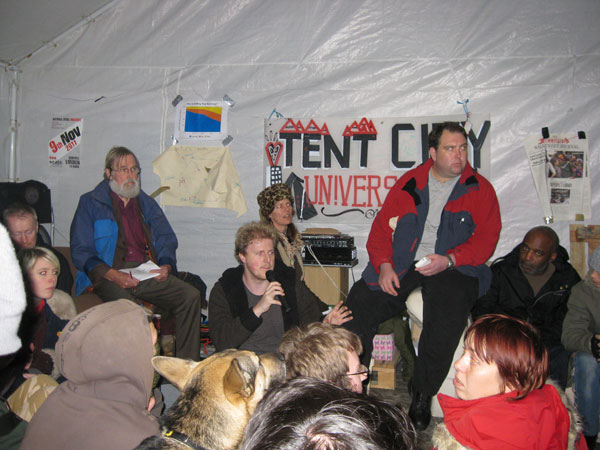 [/media-credit]
[/media-credit]
On Wed., Nov. 30, tens of thousands of British citizens around the country demonstrated in the streets to dispute recent governmental negotiations on pensions. As a result of the nationwide strike, two-thirds of the country’s public schools closed and scores of hospitals ceased or postponed scheduled surgeries. It was deemed by the Trades Union Congress to be the largest nationwide strike of our generation.
On that day, municipal police were keeping a watchful eye on the demonstrators that assembled at the embankment, and on those that congregated at the nearby Trafalgar Square. Some of the demonstrators proudly wore “99 percent” T-shirts and other attire proclaiming their allegiance to O.L.S.X.
The English Occupy movement was directly inspired by Occupy Wall Street. Nearly a month after O.W.S. sprouted in Lower Manhattan, British public-sector workers, intellectuals, students and activists similarly banned together in London and elsewhere in the United Kingdom to protest austerity measures, financial inequality and political elitism, as well as other perceived injustices, such as racism and wasteful forms of energy production.
Since mid-October, O.L.S.X. has been camping out next to St. Paul’s Cathedral, in the heart of London’s financial district dubbed the “Square Mile.” Like at O.W.S., the British protesters hold General Assemblies, working group meetings and other public sessions to shed light on the economic and social inequalities they seek to change. Also mimicking O.W.S., the demonstrators have created a regularly updated Web site, www.occupylsx.org, as well as a weekly newspaper, “The Occupied Times of London.”
More than 200 tents of all sizes and colors line the sprawling plaza surrounding the cathedral. Many of them were covered with signage decrying social wrongdoings and sporting quotes of revolutionary authors, such as Jean-Jacques Rousseau. Messages also covered the columns of an atrium that diagonally faces the plaza. “The world’s resources must go toward caring for people and for the planet — not the military, corporate, profits or rich,” read one of these.
Another sign trumpeted O.W.S.’s famous slogan, “This is what democracy looks like.”
As was the case at Zuccotti Park, O.L.S.X. has medic and food stations, a library and a kitchen. It is also equipped with generators donated by individuals, as well as port-a-potties, and is planning to switch to energy-efficient lighting soon, according to student Artin Giles, one of the protesters.
There is even a tent designated as a haven for women and children.
The public meetings are held in “Tent City University,” a spacious, white tent connected to the library, where people congregate to discuss energy conservation methods and the financial crisis, among other pertinent topics. Tent City University is also open throughout the night to those seeking shelter.
I observed protesters huddle in and around the tents, strumming guitars, proudly holding up signs, setting up mini-picnics and spouting chants using bullhorns.
Some 150 O.L.S.X. protesters have also occupied Finsbury Square, a small park in central London, as well as an abandoned U.B.S. building, since the St. Paul’s encampment has now been filled to the brim. Perhaps this is the type of full-fledged occupation O.W.S. had once envisioned. But instead, the New York-based protesters were ousted from their base at Zuccotti Park and are struggling to find a new place to call home.
On Thurs., Dec. 1, a day after the nationwide strike, a few dozen demonstrators convened in Tent City University for the 7 p.m. General Assembly. One of them presented the “10 commitments” of the O.L.S.X. mission.
Commitment number one says, “The camp aims to provide for the basic human needs and to nurture the best qualities of humanity.” The other commitments stress the responsibility of the campers to create a caring environment and a “just, fair and equal society.”
However, the City of London Corporation, the municipal governing body of the “Square Mile” — including the historic core of London — is pressing legal charges against the tented village, claiming it is blocking pedestrian flow around the cathedral and could damage tourism and local business. C.C.L. has reportedly spent more than 450,000 pounds on camp surveillance and cleaning services alone, and has spent 200,000 pounds so far on legal fees.
An attorney for C.C.L. insisted that, while wishing to end the occupation, the city does not intend to protect the banks nor stymie peaceful protests.
“The city’s position is: Peaceful protest? Yes. Permanent encampment? No,” said the attorney — an idea that might sound all-too familiar to O.W.S.
C.C.L. has, in fact, already tried to boot out the protesters and end the encampment. The City of London submitted a nearly 100-page document replete with testimonies from cathedral staff, police, an environmental health officer and a social worker, according to a Nov. 23 news article published in the Guardian. A court hearing is scheduled for Dec. 19, according to C.C.L. spokesperson Nicholas McClelland.
The corporation even offered to let the occupiers stay on its turf so long as the occupiers left by the new year.
So far, though, the city’s and church’s efforts to get the occupiers to vacate have proven unsuccessful.
“Obviously,” McClelland added, “no enforcement will take place until after a court order is made.” That’s a strikingly different approach than the one taken by Brookfield Office Properties, which authorized the N.Y.P.D.’s Nov. 15 eviction of O.W.S. from Zuccotti Park. In the case of O.W.S., a judge ruled in favor of Brookfield after, not before, the eviction occurred.
Were enforcement to take place against O.L.S.X., police “would stand by to prevent a breach of the peace, etc.,” according to C.C.L. press officer Greg Williams. Whether the British police would lead the eviction, as the N.Y.P.D. did in Lower Manhattan, however, is uncertain.
So, it seems as though an overnight ouster comparable to that at Zuccotti Park isn’t in the cards for O.L.S.X., and that for now, the protesters there will continue, uninterrupted, to sleep, eat and exchange ideas just steps away from the London Stock Exchange.



































